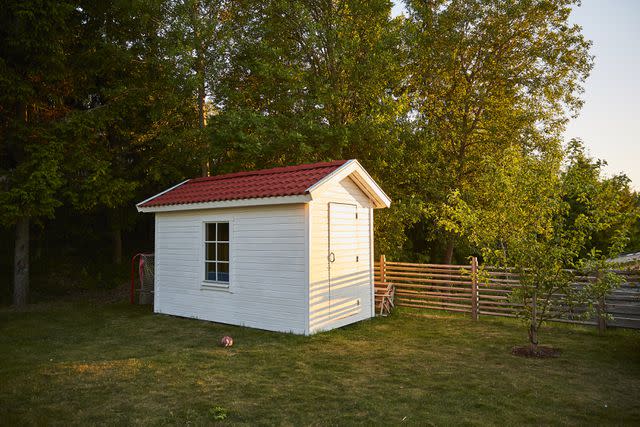12 Things You Shouldn't Store In A Shed, According To Experts
Professional organizers share the dos and don'ts of shed storage.
Fact checked by Khara Scheppmann
Is your shed feeling a bit too cluttered these days? Odds are, you’ve filled it up with items that actually shouldn’t be stored in there anyway. “Sheds are best for things you use nearby—such as yard equipment, outdoor decor, holiday decor for your yard, and anything else you use outside,” comments Perri Kersh, the founder of Neat Freak™ Professional Organizing, LLC, in Chapel Hill, North Carolina. “Most sheds are not temperature controlled, so they are not ideal for items that require a steady temperature.” Below, Southern professional organizers weigh in with 12 categories of items that you definitely should not be keeping inside your shed, no matter what.

Getty Images
Clothing And Linens
It’s best to keep off-season clothing and other textiles out of the shed. “Damp air can create moisture and cause mold or mildew to grow on these items,” explains Kristin Gorin, the co-founder of Richmond, Virginia’s Get Organized RVA. Plus, critters may sneak in and can stain, damage, or create holes in fabric. “To protect these sentimental textiles, opt for storing them indoors in a cool, dry, and pest-free environment,” advises Rachel Gitzen, the founder of Rah and Co in Columbia, South Carolina.
Food
By no means should your shed serve as an extension of your pantry; food items of all kinds will suffer being stored there. “Freezing temperatures can affect canned foods stored in sheds causing the can to corrode or jars to burst spilling onto your other belongings,” Gorin says. Plus, heat may lead food items to spoil early, and boxed foods are easy for bugs and small animals to access, she adds. The same goes for pet food and birdseed.
Important Papers And Documents
Your best bet is to invest in a filing system indoors, not inside the shed. “Not only are important papers more vulnerable to theft, but they can deteriorate because of the heat,” Gorin notes. Plus, think about whether such a setup is truly practical. As Stephanie Worinkeng, the founder of A Time To Organize in Greenville, South Carolina, points out, “Aside from the climate control issue, this is not an easy space to access and enjoy the memories from photos and papers worth keeping.”
Books
Books, too, should be kept out of the shed if you’d like to be able to flip through them again. “The humidity and heat in a shed can lead to pages sticking together, mold growth, and pest infestations,” Gorin says.
Toys
You may have every intention to save toys for the next generation of little ones, but keeping these items inside your shed can be harmful. “Prolonged exposure to heat can make plastic toys brittle, causing them to crack and break easily,” Gorin explains. Dolls and stuffed animals won’t fare well if they’re exposed to the elements, either, she adds.
Instruments
If you’ve kept instruments on hand from your or a child’s past band days, place them somewhere safe indoors and not inside the shed. “Wood can warp or crack, metal components can tarnish, and strings can snap due to excessive heat,” Gorin points out. “These are not only expensive repairs but can also diminish the sound quality and overall playability of the instrument.”
Electronics
If you’re not using that DVD player anymore, donate it. “Mice and other rodents often get into sheds, and they love to nibble on wires,” comments Laura Gutowski, the founder of Everything in Its Space in Charleston, South Carolina.
Empty Storage Containers
You may have had every intention of filling plastic bins with goods for safekeeping, but if you haven’t used these for several years, they aren’t serving you. “The containers themselves are taking up valuable space,” notes Emily Evans, the founder of Eliminate with Emily in Lexington, Kentucky. “If you don't plan to move within the next year, there's no reason to keep empty bins and boxes.” Cardboard boxes, whether filled or not, should definitely be tossed, as these attract insects of all kinds. “Upgrade to plastic containers that can be thoroughly sealed,” Gutowski urges. “I prefer clear bins so you are able to see what's inside, and it's always smart to get the stackable, rollable ones so that you can use them easily in other spaces in the future.”
Summer Accessories
This general category of items pertains to all things summer-related: sunscreen, pool floats and toys, and fabric based folding chairs, as all of these products will suffer from exposure to heat—and critters, explains Mysti Byrnes, the founder of Ordonné by Mysti in Baton Rouge, Louisiana.
Paint
Byrnes says that she has made two moves since relocating to the Baton Rouge area, and both of the homes she purchased had over 10 cans of paint stored in the shed. “Heat will ruin paint, and anyone living in the South definitely experiences extreme heat nine months out of the year,” she comments. On that note, any other household improvement related items that are not yours should be tossed. “The previous owner may have left extra shingles, paint, or fence posts that no longer match,” Evans says. “Toss or give them away!”
Anything Else You’re Not Using
If it truly is no longer serving you, take it out of the shed and to the donation center. “Sheds are often dumping grounds for old toys, yard games, sporting equipment, and lawn tools,” Gutowski says. “If you don't use it anymore, donate it to someone who will, and in the meantime get extra space back to either keep things less cluttered or to make room for things related to newer hobbies.”
For more Southern Living news, make sure to sign up for our newsletter!
Read the original article on Southern Living.

